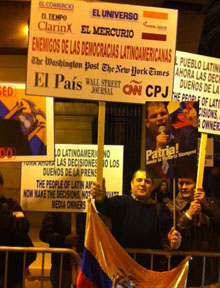The Maria Moors Cabot Prizes, administered by Columbia University Graduate School of Journalism in recognition of journalistic contributions to Inter-American understanding, are the oldest international prizes in journalism. But Josh Friedman, director of the prizes, said this year marked the first time he remembered arriving at the awards ceremony to be greeted by protesters screaming from behind barricades. The tuxedo and gown-clad guests last night shot confused glances across the street from Columbia’s Italian Academy building, where about 20 protesters brandishing Ecuadoran flags and pictures of President Rafael Correa yelled slogans like “Down the with corrupt press!” and “Long live President Correa!” One sign identified a long list of alleged “enemies of Latin American democracy” that managed to include the leading dailies of South America, the United States, Spain, the Ecuadoran press freedom group Fundamedios and the Committee to Protect Journalists.
The source of the group’s ire was the Cabot’s decision to give an honorary citation to the daily El Universo of Ecuador. In February, Ecuador’s highest court upheld three-year prison sentences and multimillion-dollar fines against three El Universo executives in a defamation suit brought by Correa. The opinion editor who wrote the critical column about the president at the heart of the suit received a similar sentence and fled to Miami, where he has been awarded political asylum. Correa later pardoned the defendants, but his actions had already done lasting damage to free expression and established his country’s reputation as one of the most repressive in the region for the press.
The bad blood between the newspaper and the president did not end with the resolution of the lawsuit. Making good on his promise to pardon “but not forget” the daily, Correa accused El Universo editor Gustavo Cortez on his weekly TV broadcast in June of being “wicked” and of “having bad faith” and, after showing a photo of Cortez, called on the Ecuadoran people to remember his face. Correa’s TV show has been a favorite venue to smear and intimidate his critics. César Ricaurte, director of Fundamedios, has been another frequent target of such attacks. And CPJ’s own Carlos Lauría, senior program coordinator for the Americas, was featured in August after the Cabot winners were announced. Lauría serves as a member of the Cabot board, and Correa, remembering a contentious encounter between the two at Columbia the previous year, showed Lauría’s photograph and said his participation was behind El Universo‘s honorary citation.
The recognition of El Universo seems to particularly outrage Correa, who strives to be viewed in a positive light by the international community. The Quito government’s decision to grant Julian Assange political asylum came as the president sought to counter his image as an opponent of free expression. But intimidation of Correa critics hasn’t stopped at the country’s borders; Ricaurte was followed and pestered by Ecuadoran state journalists when he accepted a press freedom award in September in Argentina. Thus it didn’t seem implausible to last night’s attendees that the actions outside the venue and the mysterious cameramen who followed the paper’s top directors and the former defendants in the case–the brothers Carlos Pérez Barriga, César Pérez Barriga, and Nicolás Pérez Lapentti-and documented their every move (at the ceremony as well as at a related panel discussion on Tuesday) might have some tie to Quito.
However, while accepting the award on the paper’s behalf, Carlos Pérez sent a clear message to anyone in the room, or in Ecuador, who might hope that the paper has been cowed: “We have not learnt the lesson of complicity, fear, and silence that the government tried to teach us.”
The brothers might look to the example of Teodoro Petkoff, another recipient of the Cabot, and the director and editor of the critical Venezuelan daily Tal Cual. Petkoff, whose long resumé includes Communist guerilla fighter as well as Congressional deputy and government minister, is not one to be easily intimidated by what he categorized as a “nefarious regime that despises freedom of ideas.” Tal Cual has thoroughly covered the administration of President Hugo Chávez, which has used an array of legislation, threats, and regulatory measures to gradually break down Venezuela’s independent press while building up a state media empire. Speaking to his countrymen and colleagues alike in this “noble and wounded profession,” Petkoff suggested: “All is not lost.”
The other Cabot winners of the night were three journalists covering Latin America as foreign correspondents. Miguel Ángel Bastenier, columnist for the Spanish daily El País and an instructor for the Fundación Nuevo Periodismo Iberoamericano, told the audience that “Latin America has never been more interesting” to cover. Juan Forero, who reports on South America for The Washington Post and NPR, warned against adopting simplistic ideological views of the region from the outside, where former President Uribe of Colombia is “painted as a Churchill-like figure,” and President Chavez of Venezuela is a “tropical Mussolini,” in the famous words of Carlos Fuentes. David Luhnow, Latin America bureau chief for The Wall Street Journal, who was raised in Mexico by American parents, urged his colleagues in the U.S. to look at Mexico as a cautionary tale of what happens when the gap between rich and poor becomes too great.
Despite the tumult outside the elegant Italian Academy and the challenges facing the region and the profession, the night was ultimately a celebration of the pursuit of journalism. Forero said that he tries to be realistic and helpful when he speaks to young journalism students who want to go to Latin America because, he said, speaking of their enthusiasm, “I know exactly how they feel.”
